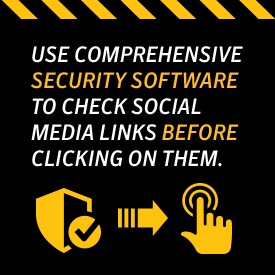Avoiding ransomware scams on social media
Ransomware is a form of malware that allows cybercriminals to hold your PC, or files on it, for ransom. This is typically much worse than your average spyware or spam, as the crooks behind the ransomware can ask for a great deal of money.

Are You Friending Extortionists?
Avoiding ransomware scams on social media
Ransomware is a form of malware that allows cybercriminals to hold your PC, or files on it, for ransom. This is typically much worse than your average spyware or spam, as the crooks behind the ransomware can ask for a great deal of money.

Help protect your digital life on your devices.
Are you afraid of losing your personal information or all the precious things on your computer? Get comprehensive protection with Norton Security Deluxe across all your devices – up to 5 PCs, Macs, smartphones or tablets.
Create an account today and try it free for 30 days on up to 5 of your devices.
Social media sites provide the perfect ingredients for these crooks’ malware recipe since they provide such a large number of potential victims to target. We’re here with some tips to help you avoid being a ransomware statistic.
How ransomware scams on social media often work
Last year, around 70 percent of social media scams were shared manually by people amongst their friends and contacts.* It’s easy to see why: People are more likely to click on a link or download software if it’s recommended by someone they know.
Here’s how it often goes down: You see a new post from your friend Emily. It says, “Check this out! It’s sooooo funny!” Emily’s always one with a quick-witted joke, so naturally you click on the link. Maybe it opens an email attachment or takes you to a site. Once you take action, malware secretly downloads onto your device.
Later, you may turn on your PC or mobile device to see a screen demanding payment to have your files unlocked. This could take the form of a fake law enforcement notice, which is meant to scare you into forking over the funds immediately.
Good grief! You didn’t know you had stepped outside the law. What do you do?
Tips in stopping social media ransomware scams
First off, you aren’t breaking any laws; the thieves behind this scam are.
That message from your social media pal likely didn’t originate from her. It was likely spoofed (meaning, it only looks like it’s coming from Person X). Reaching out to your friend—without replying via the message in question—is one way to find out.

Keep in mind, your friend may have sent the message, but cybercriminals may be using social engineering to get people to do their dirty work for them.
Proactive steps to take now:
- Definitely do not download and run any executable files from such links.
- Keep your browser and OS up to date while avoiding downloads from dubious sources.
- Make daily backups of your files and store them both on-site in an external hard drive or two, and off-site in a secure cloud storage solution.
- Most importantly, always have comprehensive security software that checks social media links before clicking on them.
Let’s say you are careful but you, or a friend, still gets a ransomware notice. What then? Do not, under any circumstances, pay the “fine.” Law enforcement would never send a notice like the scenario mentioned above, and even if you would send the funds, there’s really no incentive for the bad guys to unlock your files or device. They’ve made their money; what would they care?
Steps to take if you should fall victim to ransomware:
- Norton offers free tools to help find and remove such threats. Download the Norton Power Eraser and Norton Bootable Recovery Tool.
- Consider taking your device to local computer service professionals. This is a very common scam, so they’ve likely seen it before and can give you options.
- At worst, if you’ve backed up your files, you can always remove and replace your hard drive on your computer and reload your back-ups. Again, do not pay the extortion as that could mark you for even more scams in the future.
It’s fun to see and share cat videos and memes on social media, but keep in mind that these sites are also a haven for cybercriminals and scams like ransomware. Play it safe and help keep the bad guys out of your life. Start putting these tips into action today.

Help protect your digital life on your devices.
Are you afraid of losing your personal information or all the precious things on your computer? Get comprehensive protection with Norton Security Deluxe across all your devices – up to 5 PCs, Macs, smartphones or tablets.
Create an account today and try it free for 30 days on up to 5 of your devices.
Editorial note: Our articles are designed to provide educational information for you. They may not cover or protect against every type of crime, fraud, or threat we write about. Our goal is to increase awareness about Cyber Safety. Please review the complete Terms during enrollment or setup. Remember that no one can prevent all identity theft or cybercrime, and that LifeLock does not monitor all transactions at all businesses. The Norton and LifeLock brands are part of Gen Digital Inc. For more details about how we create, review, and update content, please see our Editorial Policy.





Want more?
Follow us for all the latest news, tips and updates.